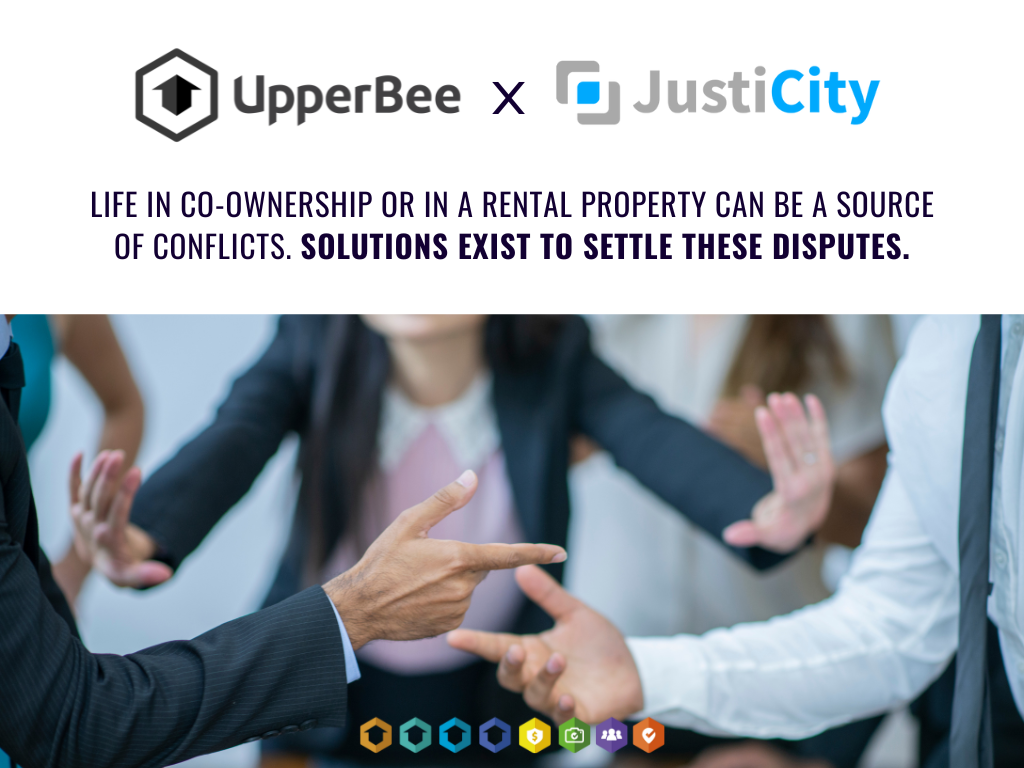Remember to start the mediation process before any situation degenerates in the condominium

7 June 2022 | arbitrage, arbitration, Co-ownership, disputes, médiation, Propert Management, Rental properties | Condo, Manager, Property management, Rental
Article in collaboration with our partner
The condominium is a place of life that brings together many people where it is not always easy to live together. It is therefore necessary to show civility and respect towards the other co-owners. Sharing the same space does not necessarily mean sharing the same opinion or always following the same logic. The art of living together is a mixture of dialogue, patience, tolerance, and respect for the rules of living together.
We have all faced distressing situations in our building. Small inconveniences, such as loud music or a neighbor who does not respect the use of common areas. This can easily degenerate and turn into a broader dispute.
In addition, the management of a condominium faces many challenges and difficulties both for the adoption of resolutions concerning work to be done, contingency fund, management of contributions or the modification of a by-law. The deterioration of relations between members and owners can sometimes lead to a lawsuit that will be long and very costly. This strategy is often the last resort, and it is catastrophic for relations between co-owners.
Another strategy is to attempt, before the trial, what is called dispute prevention and resolution (DRP): Mediation.
Mediation is the best solution to resolve non-judicial disputes that you may encounter within your co-ownership. This is a voluntary process approved by public authorities, which allows the parties to the dispute to find an amicable solution and which, in the long term, will preserve the relations between co-owners, your finances and your health.
1. How do you know if you need mediation?
The mediator is an accredited professional who can help you resolve a problem related to your co-ownership or a conflict with a co-owner. The mediator is a neutral, independent, and experienced conflict management person who will help you find a viable solution to your dispute.
Mediation can be used in several situations:
- Disputes within the syndicate that prevent the smooth operation of the syndicate;
- Conflicts between co-owners (neighborhood problem, noise, animals, smoke …);
- Conflicts related to co-ownership (parking problem, traffic, public facilities, etc.);
- Disputes between co-owners and syndicate over the distribution of maintenance expenses;
- Conflicts between co-owners and syndicate over the rules and practices of the co-ownership;
- Disputes between co-owners or syndicate and third-party companies over the execution of work or services in the co-ownership.
In all these cases and many others, rather than going to court, the best reflex will be to try prior mediation.
2. Why should you consider mediation?
- The cost of mediation is significantly lower than that of a trial.
The average cost of a civil lawsuit is $31,330 why? Because justice is governed by strict rules of procedure that are intended to allow a judge to decide a dispute by appreciating the evidence of the parties to the trial. This takes time and requires lawyers who will defend your interests and who will have to be paid.
While for a mediation, you only pay the mediator and at shared costs between the parties. However, you can choose to be assisted and advised by a lawyer.
- Mediation is much faster.
The average time to be heard in court is 24 months on average and with the health crisis we have experienced, this delay will only get worse. While the maximum period to set a mediation is 3 months.
- Mediation is confidential and helps maintain a relationship.
Mediation is a confidential process, everything that will be said in it cannot be used afterwards even in the event of a trial. If you are a co-owner, you have no choice but to live alongside each other even in the event of a dispute. Mediation is not destructive like a trial and on the contrary by allowing an amicable agreement, it allows them to maintain or even improve their relations and continue to cross paths in the corridors without hating each other.
3. What is mediation?
Mediation is a problem-solving process that implements, by the mediator, communication techniques to allow the parties to express their real needs that, once identified, can be met by solutions that the parties themselves have suggested.
Thus, the mediator does not settle disputes. It makes it possible to reach an amicable agreement that satisfies all parties and that can be homologated before the courts. Successful mediation will result in an agreement that can be homologated by the court.
Mediation is not mandatory and cannot be imposed on a party. This is a voluntary process that can be interrupted at any time if the parties do not reach an agreement.
The parties are not obliged to go to face-to-face mediation and can keep a distance by videoconference.
4. The different stages of the mediation process
- Acceptance of mediation
Mediation is a voluntary process; all parties must accept it. Each party may be assisted by a lawyer if they so wish. - Signature of the mediation agreement
In order to be able to start the process, each of the parties should sign the mediation agreement that frames it, set the limits and objectives. Mediation is strictly confidential. - Payment of mediation fees
You have the option to stop the mediation or extend it if you wish. You can share these costs or leave them to the plaintiff. - Choice of the date of mediation
Experience shows that the closer a mediation is in time, the more likely it is to succeed. However, it will be necessary to find a date common to the parties and the mediator. Avoid non-contiguous dates as much as possible, it harms the process. - Premeditation
At the beginning of the mediation, the mediator will meet alone with each of the parties. During this period, you can clearly express your needs confidentially. - Mediation
This is the most important period, the mediator is not a judge, he will listen and direct your negotiation in order to eliminate the obstacles and identify common points to finalize the agreement. The mediator will be able to hear you alone for a while if he deems it necessary. This will help the mediator understand the context. - The signing of an agreement
A written agreement containing the elements of the transaction will be signed by the parties and will be given to you. Remember that this agreement will guarantee the continuation of the common relationship. - Homologation
You have the possibility to have your agreement approved by the court. This procedure will allow you to enforce the agreement in the event of non-compliance. - In conclusion
Mediation is, in the majority of cases, a more effective way to resolve a conflict than recourse to the courts. Faster, cheaper, and confidential, it has only advantages.
JustiCity partners with UpperBee to provide you with all the mediation services you need. You benefit from a first hour of free mediation so take advantage of your advantage and consider starting a mediation process in front of JustiCity.com before any situation degenerates in the condominium.
Ivan Kasic
President, CEO
Avocat, Attorney at Law
mediator. referee
JUSTICITY
www.justicity.com
Comments
Like this article?
Don't hesitate to share it!









